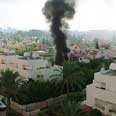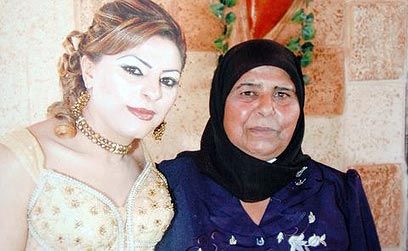
Bedouin village suffers great disaster
Residents of Arab al-Aramshe find it difficult to comprehend disaster in which mother, her two daughters were killed as Katyusha rocket hit their house yard. One of daughter recently got engaged. 'We can't believe we will not be seeing these three dear and beloved women anymore,' residents say
The yard is located next to a fortified structure, but the village's proximity to the Lebanon border does not enable the residents to be warned in time before rockets land there.
In one moment, the father of the family lost his wife and two daughters, who have another two sisters and a brother. The village residents said that Sultana got engaged about two months ago, and her engagement was accompanied by great celebrations in the village.
The three women's funeral was expected to take place on Sunday in accordance with security forces, for fear Hizbullah would continue to fire rockets at Shlomi and the nearby communities in the coming hours.

Faida and Sultana (Reproduction photo: Niv Calderon)
"Unfortunately, there is barely any warning time before Katyushas or mortar shells land here due to our proximity to the border with Lebanon. When we heard the blast we identified its origin, and when we arrived we saw the great horror. The mother and her two daughters were lying side by side bleeding, and the Magen David Adom crews that arrived at the place had nothing left to do but to determine their death," the community center manager, Mazaal Muhammad, told Ynet.
Every house in the village today has a fortified area, a secure room or a nearby shelter, but in recent days, due to the prolonged fighting and the great difficulty to stay in the fortified areas most of the day, residents tend to go out to the houses' balconies, take a breath of fresh air and stay outside the closed structures for several hours.
'Disaster incomprehensible'
Mufid Mazaal, who lives a few houses a way from the yard which was hit by a Katyusha, said that "our village is one big family, and therefore we all today fell like a part of our body has been uprooted and find it difficult to believe that we will not see these dear and beloved women anymore."
"This is a great disaster. Several hours have already passed and we miss them even more – the disaster is incomprehensible," he added.
Immediately after the blast, neighbors and family members gathered at the yard and began collecting the pieces of memory – shoes, towels, a blood-stained pillow. They then began washing the blood-stained yard. The swing on which one of the daughters was sitting and the two chairs of the mother and the other daughter were moved aside.
The villages elderly residents and many neighbors began organizing mattresses and chairs around the house in order to start the ethnic group's morning customs.
While the family members were preparing for the funeral and the mourning ceremonies, Hizbullah once again fired a heavy barrage of mortar shells and Katyusha rockets, which landed hundreds of meters away from the family home. The family members, along with friends and reporters, rushed to take shelter in a fortified structure.
"They won't stop, enough already. You already killed three women, you ruined our family and our life," one of the family members shouted.
The Katyusha hit also caused a lot of damage to the house, nearby houses and a big and ancient tree located in the center of the yard. The Katyusha barrage fired at the village also hit an electricity wire, which cut off the electricity supply to all houses and nearby areas. Employees of the Israel Electric Corporation, assisted by security forces, were working to deal with the malfunctions and restore the electricity supply.
Representatives of many Israeli and international media outlets arrived at the house in a bid to understand how the village, whose residents are not Jewish but who contribute to the State of Israel's security, was dealing with the heavy grief.
Mazaal Muhammad told Ynet that the Jumaa family house was a symbol of coexistence.
"The house is located on the main road in the center of the village and has become for many years now an intermediate station for any person passing in the area. Under the Margosa tree and next to the swing, Muslims, Druze, Christians and Jews would sit side by side. The real meaning of coexistence and peace was expressed in this house," he said.










